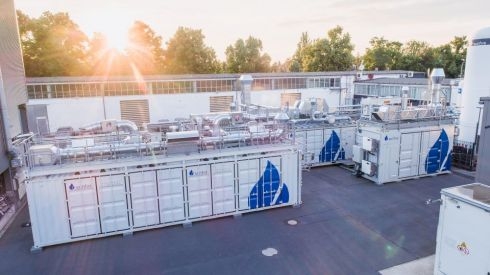Renewable fuels and chemical products, produced from renewable electricity and CO2, are considered a promising climate-neutral solution for the chemical industry and mobility. To produce these raw materials, the Dresden-based hydrogen company Sunfire develops one of the most efficient co-electrolysis technologies.
Dresden, February 7, 2023 | To become independent of fossil fuels, industry, gas suppliers and mobility need low-emission solutions. The Kopernikus P2X project, funded by the German Federal Ministry of Education and Research (BMBF), is examining one of the most promising approaches: Power-to-X technologies. These innovative solutions convert renewable electricity into other forms of energy, such as green hydrogen or renewable fuels.
The high-temperature co-electrolysis plant of the hydrogen company Sunfire is an important part of the research project that is now in its second funding phase. The Dresden-based company has recently achieved another technological milestone: after a project duration of around three years, the plant’s Factory Acceptance Test (FAT) has been successfully completed.
With this, Sunfire put its new generation of co-electrolysis into operation for the first time. The unique feature of this innovative technology is the particularly efficient process, in which synthesis gas – a mixture of hydrogen and carbon monoxide – is produced in just one step using renewable electricity from water steam and CO2. The whole process takes place at high operating temperatures of up to 850 °C.
Within the FAT, an output of up to 220 kW with an electrical efficiency of more than 85 %LHV was achieved, which represents a significant increase compared to the proof-of-concept system of the first project phase (10 kW). Sunfire relied on significant operational experience from the recently completed SynLink research project funded by the German Federal Ministry of Economics and Climate Protection (BMWK). As part of the project, the Dresden-based company developed and validated a co-electrolysis module in the ~ 150 kW size class.
The renewable synthesis gas produced by co-electrolysis can be further processed in a downstream step into alternative fuels, waxes or other chemical products. For this purpose, the electrolyzer will be delivered to the Karlsruhe Institute of Technology (KIT) at the beginning of the year and integrated into a power-to-liquid plant at the Energy Lab 2.0. The project partners aim to produce around 200 liters synthetic fuels per day with the integrated plant over the course of several campaigns.
Sunfire is known for its innovative high-temperature electrolysis based on solid oxide cell (SOEC) technology. While the SOEC is undergoing its final development steps, the company is already meeting the enormous demand for electrolysis capacity with its proven pressurized alkaline electrolyzers on a multi-megawatt scale. To this end, Sunfire is currently scaling its production capacities.
More information about Kopernikus P2X: www.kopernikus-projekte.de/projekte/p2x

The BMBF-funded project “Kopernikus P2X-2” (funding code 03SFK2Q0-2) was launched in September 2019. The project focuses on the research, validation and implementation of Power-to-X concepts.

The focus of the BMWK-funded SynLink project (funding code 03EIV031A) is the further development of technologies and value chains for the commercial introduction of electricity-based synthesis gas for the synthesis of fuels for conventional and innovative propulsion technologies in mobile applications.

Sunfire is a global leader in the production of industrial electrolyzers based on pressurized alkaline and solid oxide (SOEC) technologies. With its electrolysis solutions, Sunfire is addressing a key challenge of today’s energy system: Providing renewable hydrogen and syngas as climate-neutral substitutes for fossil energy. Sunfire’s innovative and proven electrolysis technology enables the transformation of carbon-intensive industries that are currently dependent on fossil-based oil, gas, or coal. The company employs more than 650 people located in Germany and Switzerland.
For more information visit www.sunfire.de